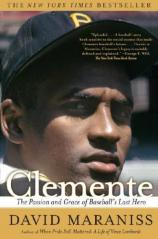Clemente: The Passion and Grace of Baseball's Last Hero
Review
Clemente: The Passion and Grace of Baseball's Last Hero
As a young boy growing up near Chicago, I attended countless baseball games at both Comiskey Park and Wrigley Field. Visits to those stadiums were a routine and regular occurrence. But each year a special treat would take place for my brother and me. My father would travel with us 90 miles north of Chicago to Milwaukee County Stadium to watch the Milwaukee Braves. I remember a game played one evening in the early 1960s when the Braves battled the Pittsburgh Pirates. Henry Aaron was the Braves right fielder and that evening he homered and played his normal exemplary game. But the star was number 21, Roberto Clemente, the Pirates right fielder who was then establishing himself as one of baseball's young stars. Clemente had two hits and showed extraordinary speed as he ran the bases. In the field he was flawless, and uncorked an incredible throw from right field as he cut down a Braves baserunner attempting to go from first to third on a hit. Even my father, not much of a baseball fan, was impressed, remarking to me, "Who is that 21, he is quite a player!" While the years have diminished some of the details of that game played more than 40 years ago, I have never forgotten the night when perhaps the two greatest right fielders of their generation performed on a weeknight evening in Milwaukee, Wisconsin.
David Maraniss selects unique subjects for his biographical talents. For reasons known only to him, he has limited his subjects to the fields of politics and sports. While these two topics may seem diverse and unrelated, in many ways they are part of a common thread. Politics and sports are a unique juxtaposition of two significant aspects of our culture, where success and failure are often public and fleeting. Many people have strong opinions about both topics and do not hesitate to publicly share those views. Politicians and sports figures often lead significantly different lives in public than in private. Thus it was with legendary Green Bay Packer coach Vince Lombardi, whose life Maraniss chronicled in WHEN PRIDE STILL MATTERED: A Life of Vince Lombardi. So it is again in CLEMENTE: The Passion and Grace of Baseball's Last Hero, a superb account of not just a man, but of an era when life in America and life in baseball underwent cataclysmic changes that profoundly altered the characteristics of both entities.
The Puerto Rican-born Clemente began his career with the Brooklyn Dodgers in 1954, an era of baseball far different from the present game. In the '50s, ownership ruled and players were commodities bought and sold at the team's whim. Clemente signed with the Dodgers because their New York location would allow greater opportunity for his family to see him play. After one year in the Brooklyn organization, the talent-rich Dodgers could not protect Clemente on their roster and he was drafted by the Pittsburgh Pirates. By 1955, when Clemente joined the Pirates to commence his 17-year Hall of Fame career, there were 28 black players in the major leagues including many who are now considered the greatest in the game.
But in the '50s, baseball was still faced with issues surrounding the influx of African-American and Latin players. Spring training in Florida found the players confronting segregated facilities for food and housing. Clemente often remarked that spring training was like being in prison. He would not forget the slights, both intended and unintended, of his time in the South. Throughout his career Clemente was a strong and compassionate supporter of the Civil Rights movement.
By 1960, Clemente was a bona-fide star in the National League. That year he led the pirates to the National League pennant. The 1960 World Series between the Pirates and New York Yankees was one of the fall classic's memorable battles. It went back and forth, and the seventh game ended with Bill Mazeroski's winning home run. Maraniss is superb in his recounting of the Series; his writing recreates the drama and tension of a hard-fought battle between two outstanding teams.
Throughout his baseball career Clemente labored under many difficulties. As a Latin player he was forced to battle the stereotype of laziness often attributed to players of his nationality. He hated the fact that sportswriters who spoke no Spanish and made no effort to learn the language mocked him by quoting his broken English. Late in his career, after another outstanding performance in the 1971 World Series, Clemente obtained a measure of revenge. As television cameras circled him for comments after his most valuable player performance in the Series, Clemente spoke first in Spanish to his parents in Puerto Rico.
CLEMENTE is more than a story of baseball, because Roberto Clemente was more than a baseball player. Throughout his life, and even in his death as he led a mission of mercy to earthquake-savaged Nicaragua, he cared about others. He lived his life as a compassionate person and much of what he did was unknown to the media. He was a great man who also happened to be a great baseball player. David Maraniss has captured the spirit and life of Roberto Clemente in this truly beautiful biography. A great biography tells the reader about a person and about the era in which he lived. In that scorebook Maraniss is two for two, both hits being home runs.
Reviewed by Stuart Shiffman on April 3, 2007
Clemente: The Passion and Grace of Baseball's Last Hero
- Publication Date: April 3, 2007
- Genres: Biography, Nonfiction
- Paperback: 416 pages
- Publisher: Simon & Schuster
- ISBN-10: 074329999X
- ISBN-13: 9780743299992





